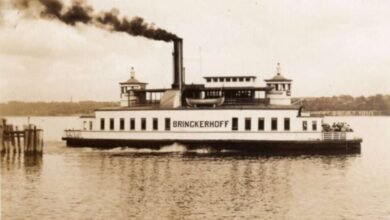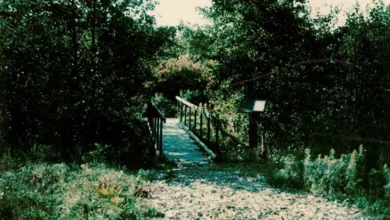Noble Sissle’s Lucky Lake: An Interracial Catskills Lake Colony


 To many historians, World War I Harlem Hell Fighters Band lead vocalist, composer, lyricist, bandleader, singer and playwright Noble Sissle (1889-1975) is the man most responsible for ushering in the Harlem Renaissance.
To many historians, World War I Harlem Hell Fighters Band lead vocalist, composer, lyricist, bandleader, singer and playwright Noble Sissle (1889-1975) is the man most responsible for ushering in the Harlem Renaissance.
In Sullivan County, NY history however, he will be forever remembered as the celebrity name behind Lucky Lake, “America’s first and only inter-racial lake colony community.”
It was Sissle’s 1921 musical revue Shuffle Along, said to be the first all-black musical hit on Broadway,that inspired others in the years that followed, directly or indirectly launching the careers of numerous notable African American performers.

 “More than just another show on Broadway, ‘Shuffle Along’ helped to usher in the Harlem Renaissance, showcasing the excellence in Black culture through Black art. Additionally, the production marked the first time the orchestra of an audience was integrated on Broadway,” Marc J. Franklin wrote in a 2021 article for Playbill magazine.
“More than just another show on Broadway, ‘Shuffle Along’ helped to usher in the Harlem Renaissance, showcasing the excellence in Black culture through Black art. Additionally, the production marked the first time the orchestra of an audience was integrated on Broadway,” Marc J. Franklin wrote in a 2021 article for Playbill magazine.
“This revue legitimized the African American musical, proving to producers and managers that audiences would pay to see African American talent on Broadway,” writes Jo Tanner, Ph.D., for the Kennedy Center. “President Harry Truman even picked a ‘Shuffle Along’ song for his 1948 campaign anthem, ‘I’m Just Wild about Harry.’”
Furthermore, Dr. Tanner maintains, the revue, “written by the famous comic duo of Flournoy Miller and Aubrey Lyles, with music and lyrics by the vaudeville team of Noble Sissle and Eubie Blake… dealt a major blow against racial stereotyping.”
Lucky Lake Estates
Lucky Lake Estates was developed in the 1950s around Luxton Lake, a 2-1/2-mile long section of Ten Mile River in Tusten that had been dammed up, and in the 1900s provided recreation for a few small boarding houses — the Homestead, owned by Robert Huebner was probably the best known — not unlike hundreds of others in Sullivan County at the time.

 The lake was named for George Luxton, who had at one time owned most of the property around it. When the boarding houses closed, some developers got the idea to divide up the property and sell small homesites.
The lake was named for George Luxton, who had at one time owned most of the property around it. When the boarding houses closed, some developers got the idea to divide up the property and sell small homesites.
Aggressive advertising of the homesites aimed at working class African Americans typically included unabashed name-dropping, and personalities such as New York Giants center fielder Willie Mays, musicians Sissel and Bill Doggett and actress Hilda Simms were often cited as property owners.
For $100 down and 37 cents a day, one could purchase a lot, and many did, some building modest homes suitable for vacation living.
The developers turned one of the old boarding houses into a clubhouse, which became the center of social activity, often hopping to the wee hours of the morning on summer weekends.
But Noble Sissel was more than just a property owner at Lucky Lake Estates.
“Noble Sissle Named Head of $1 Million N.Y. Resort,” read a headline in the March 24, 1955 edition of Jet magazine. “Showman Noble Sissle was named executive vice president of the $1 Million Lucky Lake Catskill Mountains Resort in upstate New York, scheduled to open May 31,” the article continued.
“The 720-acre property, formerly the estate of a wealthy hotel operator, is being developed as a completely equipped mountain resort for Negroes, with a motel, ballroom, casino, outdoor theater, and boating facilities.”
Perhaps one of the most innovative gimmicks used to sell the lots at Lucky Lake was a paid advertisement that ran regularly in the popular African American newspaper New York Age which was designed to look like an entertainment column along the lines of those written by Walter Winchell or Ed Sullivan.
The “column” was called “Shooting the Breeze” and appeared with the byline, Mr. Lucky. The first one appeared in June of 1957, and was entitled, “Introducing Mr. Lucky.”
“Call me Mr. Lucky, because I never believed I could ever own my own little estate in such a place as this,” the column began. “10,000 square feet of high, dry land… and that’s forever, with a free full warranty deed, plus title insurance.”
Mr. Lucky went on to tout the private clubhouse — for members only — the five miles of shore line (which was sometimes advertised as six miles), the great fishing, and the 400 acres of private hunting land. And, of course, he name-dropped, mentioning each of the aforementioned celebrities, and then some.

 About 300 of the lots were sold, and a vibrant community existed at Lucky Lake for a number of years, made up mostly of summer residents, with a handful of year-around families.
About 300 of the lots were sold, and a vibrant community existed at Lucky Lake for a number of years, made up mostly of summer residents, with a handful of year-around families.
But heavy truck traffic over the aging dam eventually caused it to crack, and the New York State Department of Environmental Conservation (DEC) decided it was unsafe in 1983.
They ordered the dam removed, and the lake immediately disappeared, much to the consternation of the homeowners there.
Without the lake, many homeowners simply abandoned their properties, and without sufficient members to financially support it, the clubhouse was soon closed.
Homeowners banded together to sue the Town of Tusten and the developer for $20 million at one point, but lost. That was the end of Lucky Lake Estates, the self-proclaimed “first and only inter-racial lake colony community.”
Noble Sissle died in Tampa, Florida on December 17, 1975. He was 86. He is buried in Long Island National Cemetery.
Illustrations, from above: Noble Sissle in 1951 (by Carl Van Vechten); Sheet music cover for I’m Just Wild About Harry from the musical Shuffle Along by Noble Sissle and Eubie Blake, 1921; Lucky Lake Advertisement, Daily Mirror, May 13, 1955; and swimmers at Lucky Lake (courtesy the Roach family).
Source link





